Steering wheel vibration occurs for many reasons. There are various symptoms by which you can determine the causes of steering wheel vibration. The steering wheel can vibrate both at a certain speed and constantly. Steering wheel vibrations can occur when accelerating, driving and braking the car, as well as when the engine is simply running on Idling.
Steering wheel vibration at speed is most often due to unbalanced rotating masses. There may be different reasons for this phenomenon, which can also simultaneously complement each other. Vibration of the steering wheel can occur due to clogging of the disc with dirt. Some Models rims are so constructed that dirt can accumulate in certain places, and, when dried, create an unbalanced mass. The first thing to do if you experience steering vibration is to wash all the wheels and make sure they are free of dirt.
Vibration of the steering wheel can occur if the wheel is poorly balanced. This problem can only be solved with the help of a tire service. If, after visiting the tire shop, the steering wheel vibrates during acceleration and movement of the car, then we can confidently say that the reason for this is poor wheel balancing.
Steering wheel wobble can be caused by incorrect wheel or tire geometry. This can be caused by improper repair of a tire or disc, or a strong blow, from which, for example, “bumps” appear on the rubber. A wheel with such defects can be perfectly balanced, but wheel runout will still be present, creating dynamic loads on the suspension and steering vibrations.
Also, the cause of steering vibrations can be incorrect installation of the wheels, or if the parameters of the disc do not match the parameters of the hub. A common mistake is to incorrectly tighten wheel bolts or wedge nuts. Nuts or bolts with a tapered base must be tightened in alternation with the opposite, and only if the wheel is in weight.
Vibration of the steering wheel during braking can also occur due to unbalanced wheel masses. But the main cause of steering wheel vibrations when braking a car is a strong uneven wear of the brake pads or discs. You can fix this problem by replacing the brake discs and pads with new ones. A cheaper way to fix this problem may be to re-groove the brake discs, if their design and size allows it.
The cause of vibration of the steering wheel during acceleration, movement and braking may be deformation of the wheel hub or other load-bearing elements car suspension. You can diagnose this problem by measuring the runout of the wheel installed on the car, when it rotates in a suspended state. The deformation of the wheel hubs is most often the result of a high-speed collision with a speed bump or a large pit.
Vibration of the steering wheel at idle can occur for many reasons. The most common problem is a faulty engine or transmission mount. You can fix this problem by replacing the supports that are out of order. Vibrations on the steering wheel can occur when the engine is idling unstable. In this case, you should check the candles.
Vibration can occur on the steering wheel due to imbalance or breakdown of the air conditioning fan. If the air conditioner radiator is clogged, then the air conditioner fan will constantly run at maximum speed, which can also cause steering wheel vibration.
Whatever the reason, steering wheel vibrations are not normal, but are a kind of “critical signal” to the driver that the car is malfunctioning. If vibrations appear on the steering wheel, their cause should be immediately identified and eliminated.
Not the most pleasant is the moment when suddenly, when driving, there is a vibration on the steering wheel. And although the external manifestation of a malfunction is precisely this, the reasons that cause it are quite numerous. However, in any case, they will need to be eliminated. Often the main difficulty is to establish the source of beats. And here the conditions under which they appear will be decisive.
When does the steering wheel vibrate?
The most unpleasant thing is that its appearance can be expected at any moment. Sometimes, it is even difficult to understand why this is happening. By itself, at first glance, the vibration of the steering wheel does not look like something dangerous. It manifests itself in the fact that the steering wheel begins to shake finely, although sometimes the magnitude of these fluctuations can reach quite large values and even transferred to the car body.
Why does the steering wheel vibrate? Because the steering wheel is connected to the suspension, the movements of the steering wheel are ultimately transmitted to the wheels, and accordingly, their vibration is transmitted to the steering wheel. If you try to somehow generalize when the vibration of the steering wheel appears, then you can define the following situations:
- at rectilinear motion, and the speed value can be any, from 120 per hour to the smallest;
- at the time of turning the steering wheel;
- during acceleration and braking of the car;
- when the engine is idling.
Perhaps, a few more situations can be added to this list, but the above information describes the situation quite fully - the vibration of the steering wheel when the car is moving is the result of a malfunction, and given the variety of conditions for its manifestation, we can say that the reasons for this can be very different. In view of their multiplicity, to describe at least some of them, each must be considered separately.
Why does the steering wheel vibrate when driving?
The very movement of the car is not something integral and indivisible. It consists of separate elements - the car either goes evenly, or is on braking, acceleration, performs a turn or other maneuver.
Steering wheel vibration at speed
It occurs most often, and manifests itself in different ways. Vibration possible:
- in case of exceeding a certain speed, for example, if the car goes 120 km/h;
- in a certain speed range (for example, 100 -120 km / h) and completely absent outside this range;
- without any system, done chaotically and without reference to a certain speed.
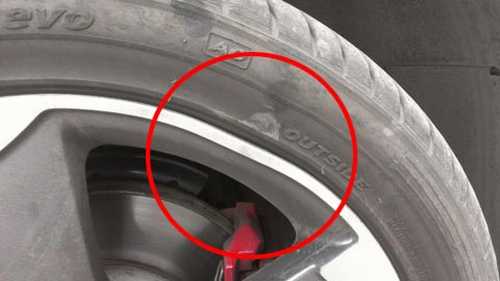
The causes of beats during movement are most often associated with wheels, disks, rubber. In this case, this is a fundamental point - it is the vibration that occurs during movement that is due to the state of the mentioned elements. Why it happens? Due to the appearance of an imbalance on the wheels, which leads to their beating when the car is moving at speed and vibrations on the steering wheel. If you start to figure out what they are caused by, then you can note a few possible causes, leading to such an effect on different speed(and over 120 km / h, and at low):
- Bad or its violation. Eliminated by repeating it. If the wheel fails to balance, or the vibration continues after successful balancing, then the cause may be damage to the tire itself. However, before changing tires, check everything else, maybe it is other products that serve as a source of vibration on the steering wheel.
- The appearance of dirt on the discs, which can cause their imbalance. It is eliminated by visiting a car wash, as well as a thorough inspection of the discs, especially their inside, for the presence (absence) of dirt.
- Disk or tire damage, they are said to have "squared". Most often this happens after hitting an obstacle, especially at high speed and when the wheels are locked (during braking). In this case, the disk geometry is violated and the tire itself is damaged, which serves as a source of vibration on the steering wheel. Moreover, this explains why it appears when driving at different speeds. Here, the degree of damage and, accordingly, the magnitude of the imbalance will be decisive; if it is significant, the steering wheel may vibrate during braking, as well as on low speed. It is eliminated either by straightening the disk, or by replacing it and the tire. In this case, rubber damage is especially dangerous. The wheel can be successfully balanced, but the vibration still remains.
- Damaged hub or other suspension components. It also occurs after hitting obstacles.
- Incorrect mounting of the wheel on the car or the use of discs that do not meet the manufacturer's requirements.
Steering wheel vibration when braking
The conditions of occurrence (when braking) indicate malfunctions of the brake pads and discs. In the best case, this can be dirt sticking to the discs, and after removing it, the normal mode of driving of the car is restored.
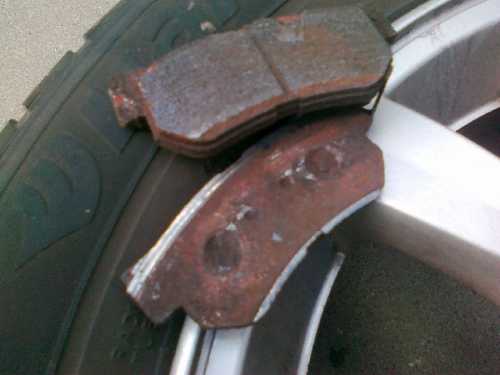
Another reason why the steering wheel may vibrate during braking will be uneven wear on the pads and discs. In this case, the only option to get rid of the vibration on the steering wheel during braking is to replace the pads, quite possibly, together with the discs.
Steering wheel vibration at idle
The reasons for its occurrence at idle are quite difficult to establish. This is most often caused by wear on the gearbox or motor mounting pads. Eliminated by replacing failed parts.
You should also pay attention to a malfunction of the ignition, in this case the motor "troit", which causes it to vibrate when idling. It is usually eliminated by replacing the candles.
This is not a complete list of possible reasons. When the steering wheel beats, when the engine is idling, it is necessary to diagnose the car.
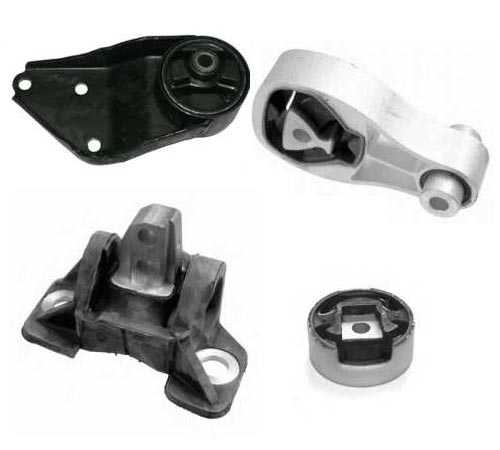
When turning
The situation when vibration occurs when turning the steering wheel is rather uncertain. When such a movement is performed, a large number of different mechanisms take part in the work, and it is simply impossible to say unambiguously which of them is associated with the occurrence of beats.
These can be steering tips and rods, wheel bearing and wheel imbalance, CV joint, etc. To establish the source where the vibration comes from, it is necessary to visit the service station and conduct diagnostics.
Why does the steering wheel vibrate when accelerating?
In cases where the steering wheel beats during acceleration of the car, the reason is most likely related to the suspension elements. Most often it is caused by damage to the hub due to hitting an obstacle. You can check this by measuring the runout of the wheel when it rotates in the suspended state.
In addition, vibration during acceleration can be caused by drive elements, but the exact cause can only be established by diagnostic results.
What do steering wheel beats indicate?
It should be noted that the appearance of vibration, whether it is steering wheel vibration during braking, or any other, is a sign of a vehicle malfunction. Regardless of the mode in which it manifests itself - when driving at a speed of at least 40, at least 120 km / h, braking or accelerating, at idle or cornering, this should be taken as a signal to eliminate the causes of beats as soon as possible.
The most common source of vibration is the chassis or suspension. And even if it only appears under certain conditions, braking or at a speed of 120 km / h, this should not be an excuse for tightening the repair of the car. Driving safety can only be ensured by a serviceable car.
The given causes and conditions for the occurrence of vibration of the steering wheel of a car do not cover all options causing it to appear. And, nevertheless, this information should help to understand how dangerous the operation of a vehicle with such a malfunction is, and take timely measures to eliminate it.
I am glad to welcome you, friends, on the blog "Note to You"
If you still want to deal with this problem yourself, first you need to understand that steering wheel vibration can occur for quite different reasons. To determine the true cause of its occurrence, it is necessary to analyze the symptoms of the vibration itself. Namely: how often does the steering wheel of your car vibrate, and at what speed? Does this phenomenon occur when braking, accelerating, driving, or just when the car's engine is idling?
Ways
1. If steering vibration occurs at speed, as a rule, this indicates unbalanced rotating masses. Although there may be other reasons and even several reasons that simultaneously complement each other. Also, the vibration of the steering wheel can be associated with clogging of the rims with dirt. Some disc models have a design that allows dirt to accumulate in certain places, and, when dried, create an unbalanced mass by its presence. Therefore, if steering vibration occurs, experts advise first of all to thoroughly wash all the cars, and then, after making sure that there is no dirt on them, check again if the steering vibration is still there.

2. Also, the cause of this trouble may be hidden in a poorly balanced wheel. However, in this case, you need to seek help from a tire service, since you can’t cope with this problem on your own. Although, unfortunately, there are cases when the vibration in the steering wheel appeared precisely after visiting a low-quality repair shop. Here we can safely say that the fault was the poor balancing of the wheels and the negligent attitude of the service workers.
3. In addition, steering wheel imbalance may result from incorrect tire geometry or. As a rule, this is caused either by a strong impact of the wheel on an obstacle on the road (a bump has formed on the rubber), or by improper repair of the disk or tire. And although the defective wheel can be balanced, the knock will not disappear and will continue to create steering vibration as a result dynamic loads on a hanger.

4. Incorrect installation of the wheels or disc mismatch with the parameters of the hub can also cause vibrations. In addition, not all motorists know how to properly tighten wheel bolts or nuts with a cone base. This should be done only when the wheel is on weight, manually, alternating opposite bolts when clamping. Otherwise, unpleasant vibrations may also occur.
5. If the vibration of the steering wheel is felt when the car is braked, this is most likely due to unbalanced wheel masses. Quite often, steering wheel vibrations during braking occur as a result of severe uneven wear. You can easily fix this trouble, for this you need new brake discs. Or, if the size and design allows, you can make a groove of the brake discs (this method is much cheaper).
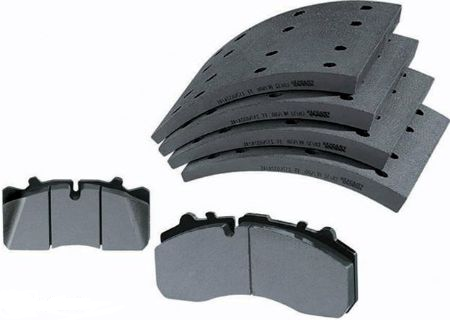
6. Does the steering wheel vibrate during acceleration, braking and driving? Most likely, the reason is the deformation of the wheel hub or other load-bearing suspension elements. This problem can be diagnosed by measuring the amplitude of the wheel mounted on the car during its rotation in a suspended state. As a rule, the deformation of the wheel hubs occurs as a result of the wheel falling into a pit at high speed, or during a sharp collision with a speed bump.
7. If steering vibration occurs at idle, the most likely problem may be a malfunction of the gearbox or engine mounts. To fix this problem, you should replace the failed supports. Also, the vibration may be caused by unstable idling of the engine. In this case, it is necessary.
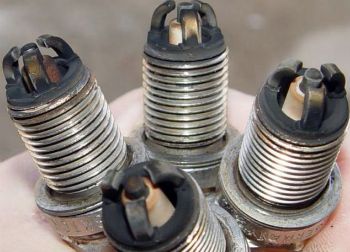
8. In addition, vibrations may occur due to the breakdown or imbalance of the air conditioner. For example, if the radiator car air conditioner clogged, then its fan will constantly run at the highest speed, which in turn can create vibrations in the steering wheel.
In any case, whatever the true cause of the malfunction, steering wheel vibration is not a normal phenomenon, but an alarm signal that tells the driver that his car is out of order. Therefore, you should not delay the diagnosis and repair of the machine, because in this case your delay can cost a lot more expensive than money. By contacting the service, you will protect yourself from unpleasant surprises on the road.
Friends, if you liked the article, share the information if it's not difficult for you in social networks with your friends! If you have questions and something to add on the topic, leave your comments, I will always be happy to help!
Sincerely, admin of the blog "" Bronislav!




